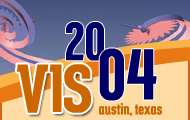 |
| VIS SESSIONS | ||||
| |
Workshops Saturday
Workshop 1 (Full day)
Information visualization systems and toolkits are becoming available for a large range of visualization and interaction techniques and are used in diverse application domains. This workshop is aimed at gathering experts involved in building such infrastructures to share their views, understand the issues involved and trying to find ways to avoid fragmentation and improve collaborations. At the end of the workshop, the position papers as well as the minutes will be turned into a white paper describing the requirements and issues raised during the workshop, as well as the state of the art of existing information visualization software infrastructures. Please click here to go to the Workshop website. Workshop Organizers: Sunday
Workshop 2 (Full day)
Ever increasing data sizes coupled with availability of commodity components in recent years has opened up exciting opportunities in handling large data visualization problems using parallel rendering systems. Extending last year's Workshop on Parallel Visualization techniques, this year, we aim to bring together various trends in Parallel Visualization by covering different aspects of the problem and covering more hands-on topics. In addition to covering parallel visualization architectures, we provide an in-depth analysis of Chromium and its applications to parallel visualization problems. Chromium allows OpenGL applications to run on clusters of computers with commodity graphics cards. Among Chromium's uses are sort-first rendering for driving multi-screen mural displays and sort-last rendering for parallel rendering. Chromium is open-source software and hosted at http://chromium.sourceforge.net/. The workshop will be divided into two main sessions followed by a closing session where the attendees can post questions and discuss open-ended issues
Workshop Organizers: |
|||